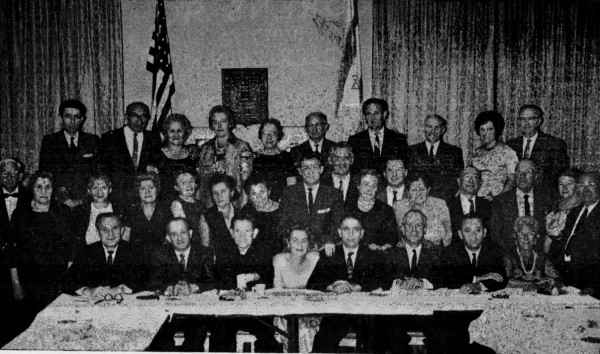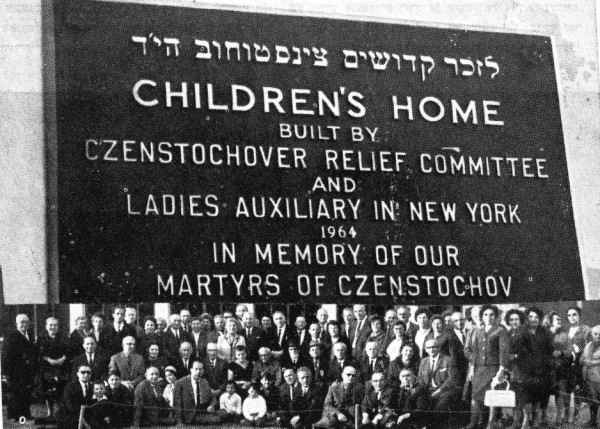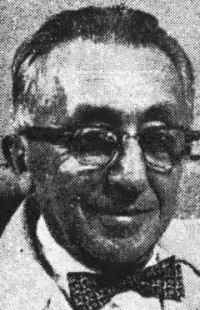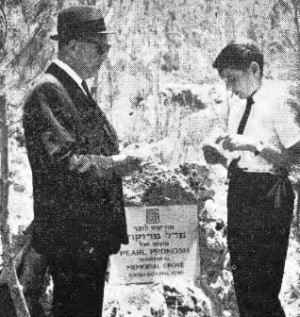Częstochowers in the Diaspora
[Pages 465-468]
“United Czenstochover Relief Committee”
and “Ladies Auxiliary” in New York[1]
Karl Wargon
All the landsleit rally around the “Czenstochover Relief” in New York, regardless of their political inclination. There are over forty active members and it is led by an executive body of nine people.
Monthly meetings are held and an annual general meeting is held, at which a report of the activities is delivered. The “Ladies Auxiliary” is actively involved and the “Relief” also carries out its work in full cooperation with the “Czenstochover Young Men's [Society]”, which is a politically, unaffiliated, friendly circle.
|
|
First row, from left to right: Harry Bratt, Jack Sztal, Karl Wargon, Miriam Zemski, Zysza Gelber, Julius Sztal, Leon Gliksman, Mr and Mrs Frajmauer
Second row: Mr and Mrs Gliksman, Mrs Szoham, Mrs Bratt, Mrs Sztal, Mrs Wargon, Mrs Czarny, Morris Zemski, J. Rajman, Mrs J. Gelber, Louis Zandsztajn, Mrs J. Sztal, Mrs J. Zylber, and Mrs Grauman
Third row: Harry Szoham, Mr and Mrs Zygas, Mrs S. Brauer, Mr and Mrs Zilbersztajn, Aba Bomba, Kuba Goldberg, Mr and Mrs Jakobi |
One of the greatest tasks the “Relief” has set itself is the immortalisation of the Częstochowa martyrs, who were murdered by the Nazi beasts.
Besides the two “Yizkor Books” about Częstochowa, which were published in Yiddish, we have also erected a “Children's Home” in Kfar Saba, Israel.
The Executive Board of the “Relief” in New York consists of the following persons:
Karl Wargon – Chairman
Julius Sztal – Vice–Chairman
A.L. Bomba – Secretary
J. Gelber – Minutes–Secretary
Louis Gliksman = Treasurer
Chairman [of the Treasury?] – Mojsze Zemski
Finances Audit – Jack Sztal; Kuba Goldberg; Joel Bratt
“Ladies Auxiliary”
Chairwoman – Mania Zemski Secretary – Golda Sztal
Treasurer – Szajdla [?] Gelber
Audit Mina Sztal.
Translator's footnote:
- Original spelling used by this association. Return
[Pages 469-472]
Opening Ceremony of the Kfar Saba Children's Home
Ezriel ben–Moshe (Jakubowicz)
For many years, our brethren and landsleit in New York have strived to commemorate our parents, brothers and sisters, and all the dear ones, who were annihilated in Częstochowa by Hitler's dark beasts.
The United Czenstochover Relief Committee in America had considered various plans for the erecting of a monument [dedicated] to the destroyed Jewish Częstochowa.
Then, the Workers' Histadrut proposed erecting a building, in the name Częstochowa, in one of the children's homes in the Histadrut's network of schools.
To this end, we gathered during Pesach 1965 at the Old Settlement in Kfar Saba, where we celebrated the opening of the Częstochowa building.
There, we met fellow landsleit from all corners of the country – from Tel–Aviv, Jerusalem, Haifa, Hadera and from kibbutzim, [as well as] Częstochowers from America, England, and other places – landsleit who had left Częstochowa 30–40 years ago, along with others who had come from there only a few years earlier. There were many among us who had, themselves, been in the Nazi camps, with numbers tattooed on their arms and so–called “residents” of the Częstochowa HASAG camp. By a miracle, or simply by chance, they had remained alive. One thing united everyone – the city in which we had been born, where we had dreamed and created.
The ceremony was opened by the leader of the Misha'an[1] Institution, Ze'ev Weiner, who greeted all present and lionised the idea of the Częstochowers in America – to construct a building in such an important institution, which cares for thousands of unfortunate children, who have been left by their parents due for various reasons, as well as children with other problems, who find there a warm home.
With touching words, Mrs Czarny, Chairwoman of the American Committee, conveyed greetings from our Częstochowa landsleit in America.
Further congratulations were extended by Dr Eliyahu Horowicz, Chairman of the Częstochowers in Tel–Aviv and Mr Efraim, a member of the committee. Abram Gotlib, Secretary of the Częstochowers in Israel, read a salutation from Dr Józef Kruk, who sees this children's home in Kfar Saba as a continuation of the renowned Y.L. Perec Children's Home, which was wiped out by the Nazi criminals. Mrs Czarny and Mr Jakób Leslau unveiled the plaques which the Americans had sent. One plaque is dedicated to Częstochowa and the others plaques [carry] the names of the members of the committee, who had actively participated in the great undertaking to commemorate Jewish Częstochowa.
The Max Fein Vocational School Adopts Jewish Częstochowa
It was a work of Fate that Jewish Częstochowa, a city in which, for many years, a professional school named “Handwerker Schule” [“Craftsmen School”] operated and which was destroyed together with the Jewish settlement, should now be commemorated by being adopted by the great Max Fein Vocational School in Tel–Aviv, one of the Histadrut schools which are spread throughout the entire country.
Together with the Częstochowa landslait in Israel and around the world, we are proud that a school, in which Jewish children study, carries the name of Częstochowa and that the teachers and pupils of the Max Fein School bear, with worthiness and honour, the name of the great Jewish city and centre, which was destroyed by Nazi barbarians and murderers, who annihilated our People and city.
Translator's footnote:
- Heb. Support; network of Histadrut retirement homes. Return
[Pages 471-474]
Rafał Federman
(A Brief Biography)
E. Ben–Moshe
It is impossible for me to imagine Częstochowa without [calling to mind] the prominence of the fiery, ebullient and fighting personality of Rafał Federman who, in his impressive activity as representative of the Bund, became an inseparable part of Częstochowa's scenery and of what was done in all fields of its life.
When I was still quite a young man, I did not know Federman. At that time, he was already a famous man, whose reputation preceded him. Even once I had matured and had begun [my] public activism, I did not belong to Federman's “camp” – the Bund.
He was not content with just distancing himself from Zionism, but was simply an anti–Zionist and, as the leader of the Bund, he fought Zionism relentlessly. That said, it should be noted that he was a Jew who was proud of his Jewish origins and who commanded respect with the [various] factions of the Jewish public and, particularly, with the Jewish proletariat, who regarded him as socialism's brave dreamer and fighter. The Poles, too, treated him with deference.
I vividly recall one occasion, on which I heard that workers' parades and demonstrations had been organised ahead of 1st May and, it was to be assumed, there would be confrontations with the police. In my great curiosity as a young lad, I went out onto the street to observe the events and it was, indeed, a magnificent sight. A multitude of people marched audaciously and courageously, with many red flags flying gloriously above, with Rafał Federman marching at their head. When the procession reached the assembly place, Federman set upon the authorities in a scorching speech and preached brazenly and fervently for the realisation of socialism. He reached his peak when the Bund demonstrators met the protestors of the Polish Workers' Party (PPS). He continued his address and, in his daring words in the Polish language, he ignited the entire mixed audience of workers, both Jews and Poles, who carried him on their hands as a token of their admiration and gratitude.
Federman also gained renown for his appearances as a representative of the workers on behalf of the Bund, in the Kehilla Council and the City Council, which were always exemplary.
He was a courageous fighter against antisemitism and its manifestations, denouncing it absolutely fearlessly at every opportunity and proving its blind hatred and flawed demagoguery.
Federman, who was bound to the city of Częstochowa with every fibre of his soul, even now cannot detach himself from the memories of his past.
When I arrived in New York and Federman found out that I had served as a soldier in the British Army and that, as a Częstochowa landsman, I had been the first to visit this city in 1945, he requested of me in a letter to visit him and to tell him about the city and its remains and of its appearance following the Holocaust.
However, he was not content with the descriptions given by others, but travelled personally to Częstochowa, to absorb the atmosphere of Jewish Częstochowa. But his disillusion was extremely bitter upon perceiving the ruination of the city, in which everything had been destroyed and wiped out.
He also came to visit Israel in 1950, to see the fruits of that Zionism which he had fought against most of his life.
Federman traversed the country to its length and breadth, visiting kibbutzim, moshavim[1], cities and towns. After he had met the Częstochowers in Israel, Federman – the distinct Bund leader – “acknowledged” Israel's reality. Choking with tears of emotion, he spoke of the great creation that had taken place in Israel and [said that] he was delighted with what he had seen. Federman, with his characteristic honesty, fully admitted that he considered the State of Israel to be the only corner for the entirety of the globe's Jewry [and] that, in it, was the seed from which the trunk would rise, the branches sprout and the fruits be brought forth.
On his second visit to Israel in 1955, it was felt that he found the departure difficult and that he yearned to return and be united with his multitude of followers living in Israel, whom he loved so dearly.
Translator's footnote:
- A type of Israeli settlement similar to a kibbutz, usually a cooperative agricultural community of individual farms. Return
[Pages 473-474]
Federman Rafał
[He was] born in 1892 in Częstochowa. His parents owned a tavern and, later, a soda–water factory. After attending cheder and primary school, he completed the middle school course as an external student (self–taught).
Federman began his first social activism in the Social Democracy of the Kingdom of Poland and Lithuania, the S.S. [Zionist–Socialist Workers Party], Vereinigt [United Jewish Socialist Workers Party] [and the] Bund. Until 1922 he was a member of the Vereinigt Party's Central Committee. He then crossed over to the Bund [and] became Chairman of the Party Committee in Częstochowa, a Councillor and Secretary of the Częstochowa City Council, a member of the council of the Jewish Kehilla [and] Chairman of the Jewish Schools Organisation and the “Y.L. Perec Home” in Częstochowa.
With Kune Chrobołowski's closest cooperation, he edited the mouthpieces of Vereinigt – Unser Wort [“Our Word”] in 1919, and Das Neue Wort [“The New Word”] in 1920.
After leaving the Vereinigt Party, he became editor of the Bundist workers' newspaper, the Proletarier [“Proletarian”] – an organ of the Professional Unions Council. He also participated in other party–organs of Vereinigt and, later, of the Bund.
Federman was arrested twice and was submitted to a political [legal] process.
Since 1940, he has lived in America, where he serves as Chairman of the United Czenstochover Relief Committee. He was one of the editors and main collaborators of the book “Czenstochover Yidn”, published in 1947, and of the book “Czenstochov”, published in 1958. That same year, the United Czenstochover Relief Committee issued a booklet entitled “Rafał Federman”, marking the 50th anniversary of his social activism.
In 1957, he published a book titled “On the Shores of the Warta and East River”. In 1960, he put out a long–playing memorial record under the name “Czenstochov”, in memory of the Częstochowa Jews who were annihilated in the city which had become ruined.
[Pages 473-476]
Kune Chrobołowski
The Book Committee
Kune was born in the Łomża region, where his father Josef–Icek was a melamed. Already, as a boy of 9–10, Kune knew the Hebrew Bible and Russian well.
When the right to keep taverns was taken away from the Jews, poverty descended upon the small town where Kune's parents lived and, having no means of sustenance, the family began to wander, until they trudged their way into Częstochowa in 1905.
Kune secured a position as an employee in Markusfeld's wallpaper–factory.
In those years, when the Socialist Movement was spreading amongst the Jewish workers, Kune joined the Zionist–Socialist Workers Party (S.S.). He was active among the Jewish workers, whom he instructed on Socialism and Territorialism. With his strong Lithuanian pronunciation[1], Kune gained an influence over the Jewish masses. Throughout all the changes his party underwent, Kune remained loyal to the Territorialist interpretation of the Jewish Question.
Besides his political work, Kune was also very much involved with other communal institutions, such as “Lira”, the Jewish Literary Society and the Y.L. Perec Primary School.
Chrobołowski was an active collaborator in the local Jewish press – co–founder of the Częstochower Reklamen Blatt [“Advertisements Page”], collaborator in the Częstochower Tageblatt [“Daily Newspaper”], as well as in the political weekly paper Das Neue Wort, which was issued by the Częstochowa Vereinigt Party.
In the First World War, Chrobołowski was sent to the front as a soldier and took part in the battles.
He was captured as a POW by the Austrian Army. After the War, he returned to Częstochowa.
In 1923, Chrobołowski travelled to America, where he settled first in New York and then in Los Angeles, where he lives to this day.
In America, too, Chrobołowski participates in an array of periodical publications and is active in communal life.
Translator's footnote:
- Although Kune was Polish, his family probably belonged to the anti–Chassidic faction of Jewish orthodoxy (aka “Misnagedim” or “Litvakes”), who adhere to the Lithuanian rite as regards pronunciation of Hebrew and Yiddish. This group was very abundant in the Łomża region. Return
[Pages 475-476]
Professor Wolf Leslau
[He] was born in Częstochowa in 1906, where he completed the Jewish high school.
Between 1926 and 1931, he studied at the Hebrew Pedagogical Institute in Vienna and, simultaneously, began to study Semitic languages there[1]. Over the course of time, he became enthralled with the languages of Abyssinia[2] and, in 1931, he travelled to Paris to complete his studies with Professor Marcel Cohen [at the Sorbonne]. He did exceptionally well in his studies and, very soon, gained worldwide reputation. The world's greatest scholars extensively praised the dozens of books he wrote and, particularly, on the different dialects of the Abyssinian tongue. For this, he was also awarded a diploma [from] L'Ecole Nationale des Langues Orientales [Fr; National School of Oriental Languages] and [the title] Docteur ès Lettres [Doctor of Letters] from the Sorbonne.
Following the Nazi invasion of France, in 1942, he emigrated to the United States.
Prof Leslau was invited to lecture, as a guest professor, in prestigious institutions such as the New School for Social Research in New York, the Indiana University Language Laboratory, the University College of Addis Ababa and others.
In 1961, he received the title of Professor Emeritus from the University of Judaism in Los Angeles and, in 1963, from its counterpart, the [Hebrew] Union College. In 1965, he was awarded the Haile Selassie Prize for Ethiopian Studies and, that same year, he was also appointed lecturer on [Near Eastern] Studies at UCLA.
Prof. Leslau's main field of interest has been that of the Abyssinian languages, in which he has carried out extensive research, the results of which have been published in numerous articles and books. His various findings regarding the Abyssinian–Semitic and Southern Arabian languages have been compared to the Hebrew language and this subject has been published in different research materials, particularly in the Hebrew Lexicon [?], in the chapters dedicated to Abyssinian and Southern Arabic.
Translator's footnotes:
- At the University of Vienna. Return
- Modern day Ethiopia and Eritrea. Return
[Page 477]
Józef Kaufman
A son of Reb Berisz[1], the [rabbinical] judge z”l, he was born in Częstochowa on 24th December 1892. In the parental home, just like any other Jewish child in those days, he received a national religious[2] education and he walked the path from cheder through to private religious lessons.
In 1909, he emigrated to America.
But the threads binding him to the Old Home were not torn, despite the distance that separated him from it. He began seeking contact with his fellow landsleit, who had arrived there earlier, with the aim of founding an association of Częstochowa landsleit in New York.
In 1910, he became a member of Branch 261 of Der Arbeiter Ring [Workmen's Circle], where he remains to this day. In later days, he was able to show his connection to his birthplace and his dedication as a communal worker.
This happened in 1914, when the Częstochower Hilfs Verein [Aid Society] was founded in New York.
Contemporaries say that Józef Kaufman took upon himself the arduous duties of secretary and, more than once, put his private and communal affairs aside.
In 1917, he became a member of the “Young Men's” and occupied the office of Vice President for a time in 1918. To this day, he is one of its most active members.
Suffice it to note that, in acknowledgement of his work for Częstochowa and the Częstochowers in America, the United Czenstochover Relief Committee held a banquet on 18th September 1938 in honour of him and his wife, at which other Częstochower organisations in New York also expressed their gratitude.
His printing shop, at 416 4th Avenue, was the “Little Częstochowa” of New York. All dealings took place there, with Józef Kaufman serving and welcoming everyone with comradely love and a landsman's [neighbourly] devotion.
Translator's footnotes:
- See Volume One, col.531. Return
- It is unclear whether the author uses the term “national” here in the Zionistic sense, or the ethnic and vernacular one. Return
[Page 478]
Szmul Prokosz
G.F.
He is a son of the renowned [rabbinical] judge, Reb Jossele Kira[1].
He planted a great many trees in the “Canada Park” in Israel in memory of his wife Pelka [Perl] (a daughter of N. Kryman), who died in Canada before her time.
The tree–planting took place with a festive gathering, in which many Częstochowa landsleit participated.
Translator's footnote:
- See Volume One, col.531, same article. Return
This material is made available by JewishGen, Inc.
and the Yizkor Book Project for the purpose of
fulfilling our
mission of disseminating information about the Holocaust and
destroyed Jewish communities.
This material may not be copied,
sold or bartered without JewishGen, Inc.'s permission. Rights may be
reserved by the copyright holder.
JewishGen, Inc. makes no representations regarding the accuracy of
the translation. The reader may wish to refer to the original material
for verification.
JewishGen is not responsible for inaccuracies or omissions in the original work and cannot rewrite or edit the text to correct inaccuracies and/or omissions.
Our mission is to produce a translation of the original work and we cannot verify the accuracy of statements or alter facts cited.
 Czestochowa, Poland
Czestochowa, Poland
 Yizkor Book Project
Yizkor Book Project
 JewishGen Home Page
JewishGen Home Page
Yizkor Book Director, Lance Ackerfeld
This web page created by Jason Hallgarten
Copyright © 1999-2026 by JewishGen, Inc.
Updated 23 Jun 2020 by JH






